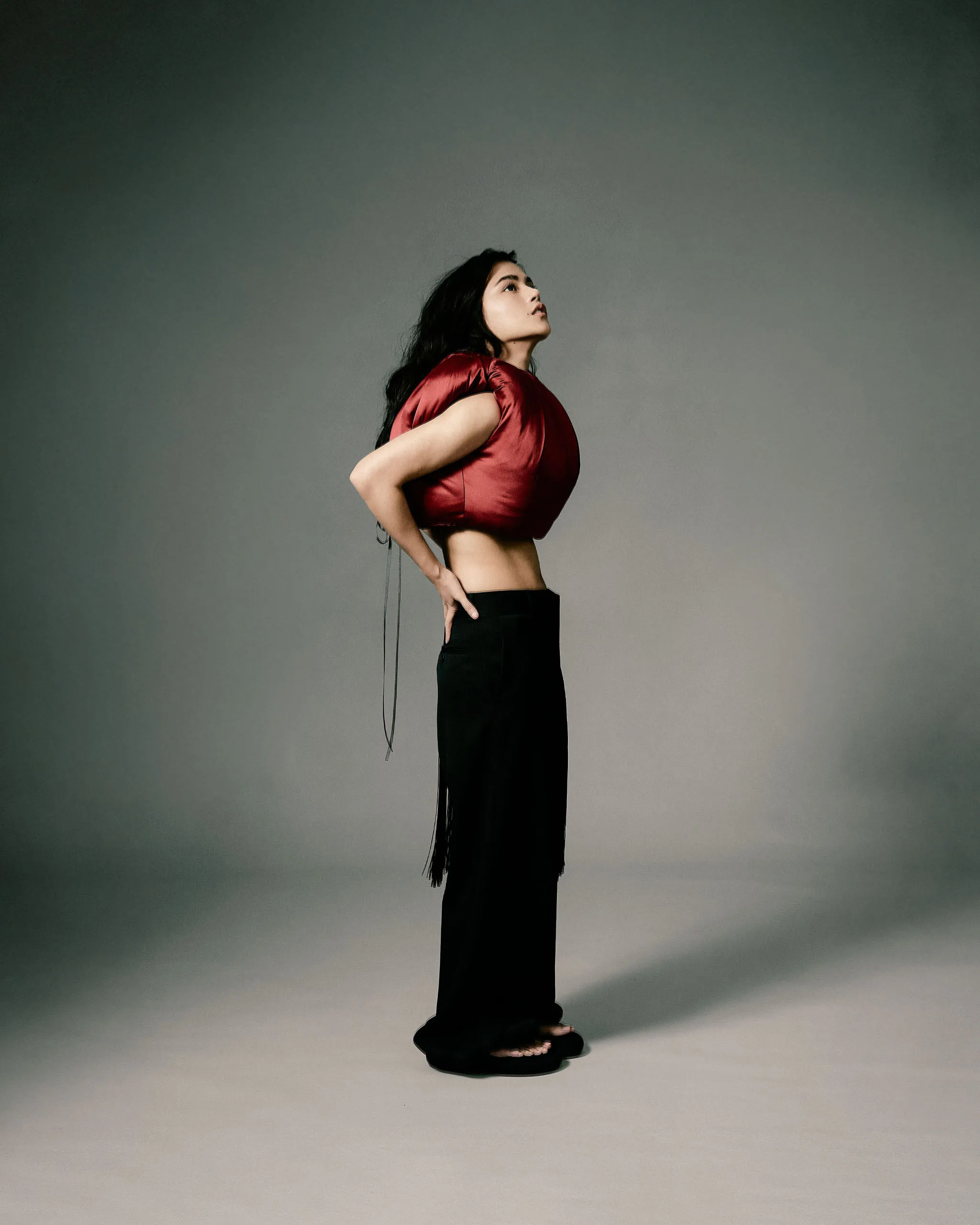Maris Racal wears a custom ZIV REI ALEXI top, MM6 MAISON MARGIELA fringe-detailing flared trousers from UNIVERS at One Rockwell, and FIORUCCI sandals from ARCHIVES D’HOMME ET FEMME. Photographed by Karl King Aguña
Following her starring role in the acclaimed film Sunshine, Maris Racal talks to Vogue about art, activism, and the art of still becoming.
When Maris Racal’s reality played out in slow motion for the first time, it felt a lot like love at first sight. The young girl was a kindergartener accompanying her sibling to the hospital, when she looked up and saw a doctor walking into the room. The sight was glorious, and it transfixed her: a lady in a white coat, a stethoscope hanging around her neck. “Oh my God,” the 28-year-old whispers, breathless as she reenacts the moment. “She saves lives. I wanna be her.”
She held onto this dream for years as she grew up in the southern island of Mindanao, letting it ripple into a move to Manila to pursue a degree in medical technology. After her first year, she joined the reality competition Pinoy Big Brother: All In, charming viewers as the “Singing Sunshine ng Davao” and placing as runner-up to winner Daniel Matsunaga.
Having signed to Star Magic agency afterward, her career propelled forward, leading to a pause in studies. “I started getting so pressured,” she laments. “I felt left out sa classmates ko, because they were in second or third year, so nag-start ako ulit na mag-med tech. And that was the time that my career started to get busy again, so I had to stop it. I chose my career.”
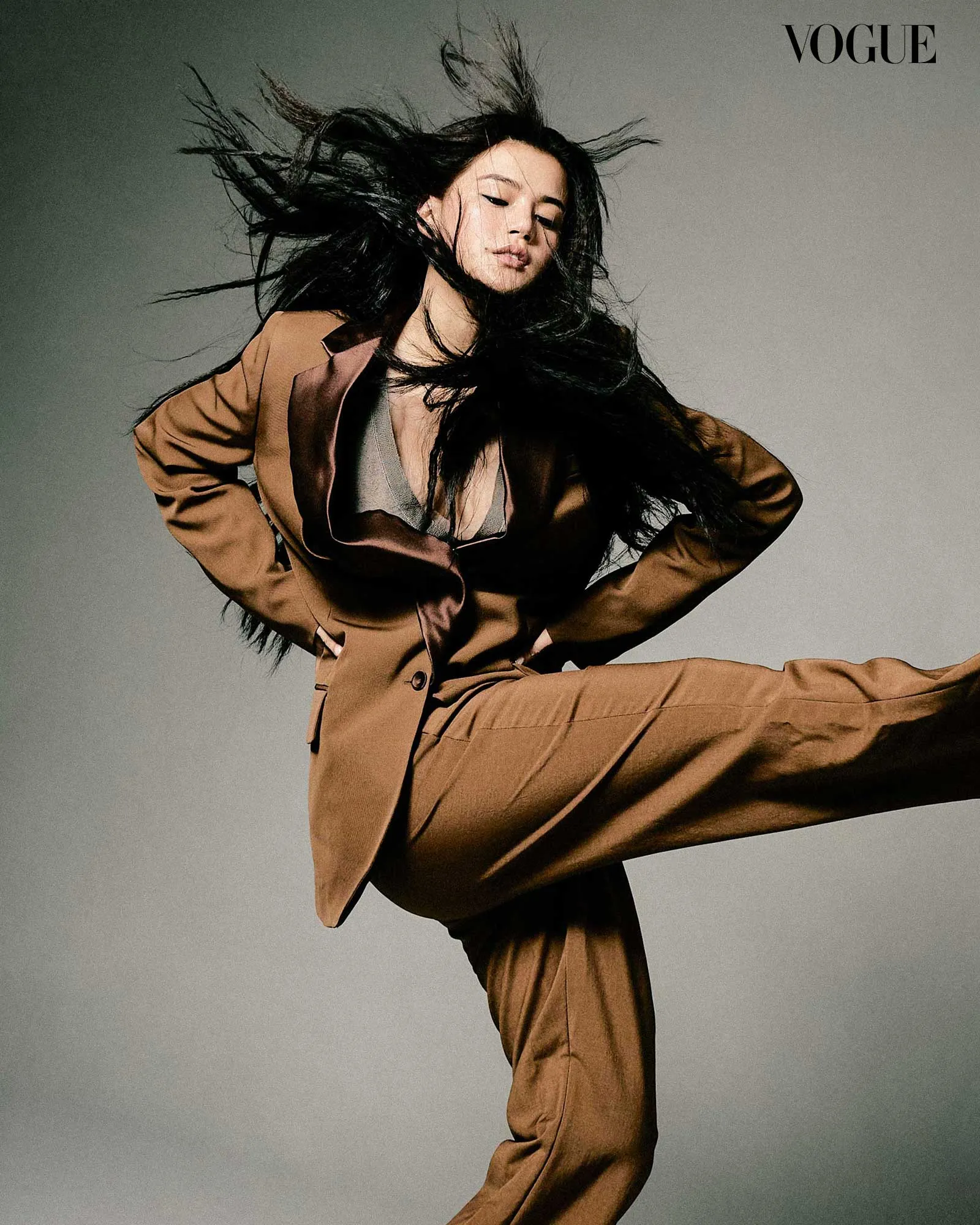
What followed were supporting roles in television series and films, ranging from the drama anthology Maalaala Mo Kaya to appearances in the noontime show ASAP, either as a solo performer or in a group. She accepted these opportunities with abandon, wanting to widen her oeuvre by playing every part she could, and playing it well.
She recalls her first movie titled Halik Sa Hangin, wherein she portrayed the protagonist’s friend in a flashback. “Ang name ko dun, si Tetay,” she says, before shrieking, “Oh my God, I remember it!” She had a single line, reacting to the death of her friend’s father. “Buong araw ko siya minemorize [I spent the entire day memorizing it],” she says, even revealing a few of her inner thoughts at the time: I cannot mess up, kailangan galingan ko. “I was really proud of myself,” she beams.
The memory reminds her of an incident shooting her first series Hawak Kamay, where she was left “traumatized by the T-mark.” A neon marker stuck to the ground, a T-mark is meant to identify the actor’s positions in front of the camera. “And I kept looking at it! I kept looking for it while the camera was on me, so I had like six takes because of that,” Maris laughs. “Sobrang raw, sobrang innocent ko noon, as in wala akong idea sa acting. But I was enjoying.”
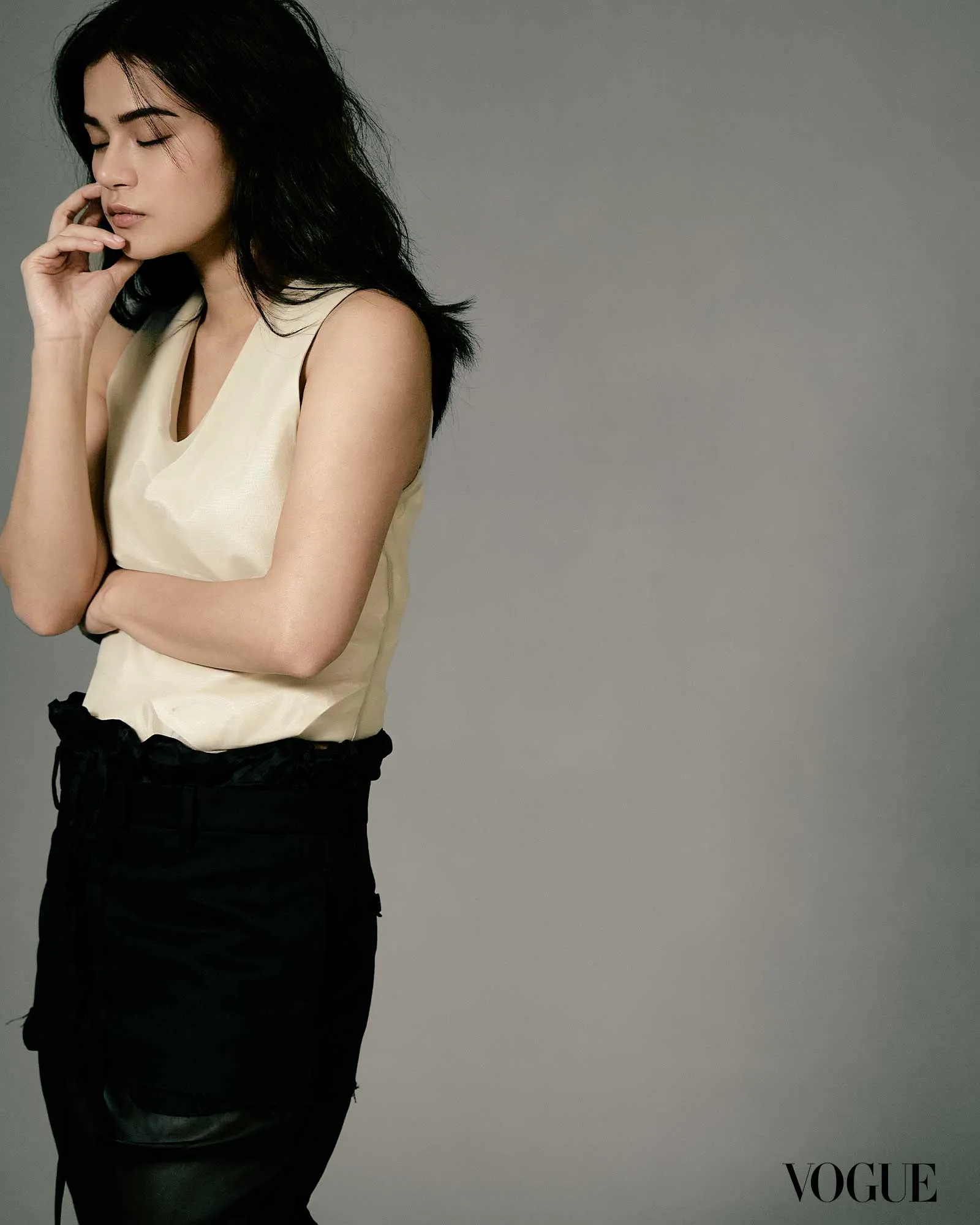
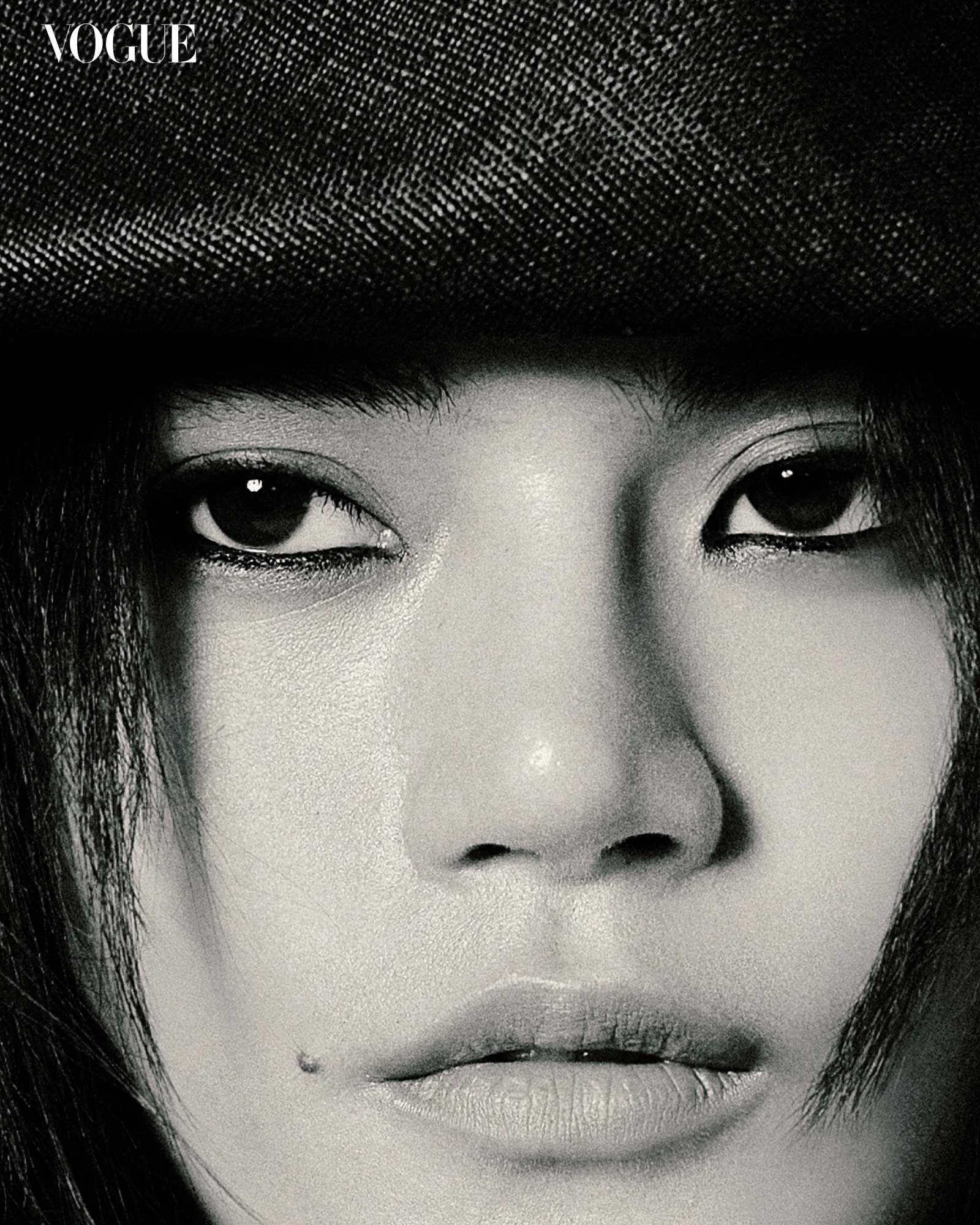
She was merely 16 then, just freshly inducted into show business. Her parents may have remained in the province while she threw herself into the throngs of the big city, but she wasn’t alone. Maris intimates, “I love my ates so much. Sila ang nagsilbing haligi at ilaw ng tahanan.” The elder of her two sisters was her driver and manager for a time, while her second eldest sister, Tin, served as her makeup, hair, and fashion stylist.
“We’re like a team, honestly,” Tin tells Vogue. “We’re kids lost in a big city, trying to figure out how things work here. It’s so different from where we grew up.” She turns sentimental, speaking of her younger sister, “I always feel so proud when I think about how hard she’s worked to get where she is now. No matter what project comes her way, she makes sure to put her all into it.”
“My job is not a playground. It can be, but it also can be a vehicle for activism. Meron din siyang power to change a person’s perspective, and that’s what I really believe in. Parang eto na yung duty ko as an actress.”
Advertisement
If that dedication has always been an undercurrent to her ethic, it’s her latest film Sunshine that thrust it to the fore. Maris is the titular teenage gymnast who discovers she is pregnant the week of national team tryouts. Although it was the first project offered to her by director Antoinette Jadaone, it was already the fourth they worked on together. They made three lock-in projects during the pandemic: The Kangks Show, Suntok sa Buwan, and Simula sa Gitna. “Our relationship really, really got deeper throughout,” the actress reflects.
Looking back on her preparation for Sunshine, she reveals that the process of studying and learning the script was very tedious. Maris undertook a deep character study, recognizing the complexities she had to flesh out. They interviewed a number of women who experienced what Sunshine did, and for the actress, it served as an awakening. “I heard very painful and ugly stories,” she solemnly recounts. “Upon learning about these things, doon ko rin na-realize na sobrang oppressive ng society and laws sa women. And it’s really, really sad. And ako, I had the privilege to learn about repercussions, about choices, sexual health, sex education. Doon ko na-realize na I have a very important job because it comes with a very big responsibility.”
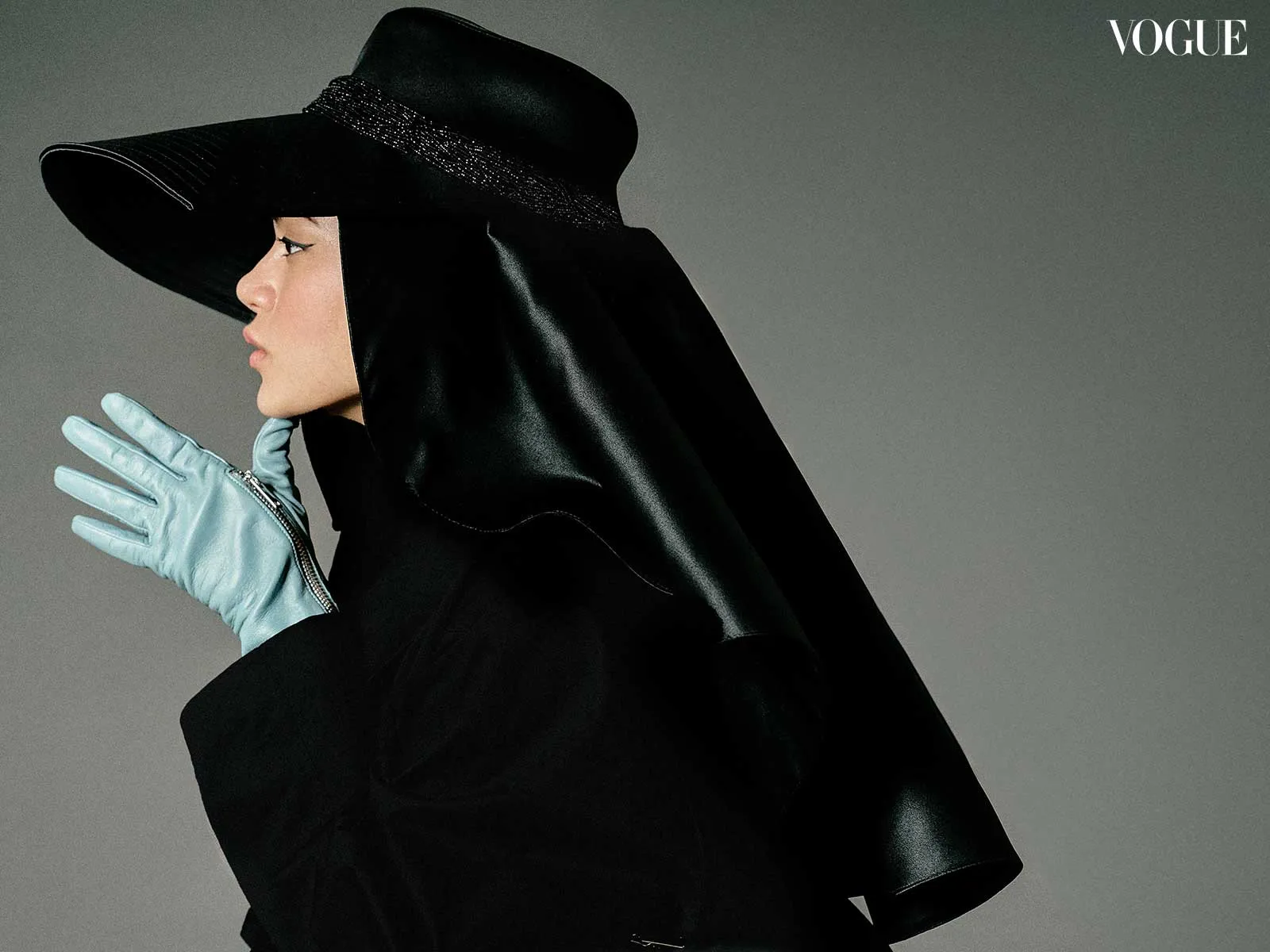
What she calls a “spark of activism” ignited over the pandemic, when she was 23. “I’ll be very honest with you, during my late teenage years, I was on survival mode.” She admits to not being so politically aware, but when Covid hit, she felt the imperative need to perceive what was going on in the country and in the world. She describes it as an urgent wake-up call to open her eyes, to question those who lead our nation. A couple of months ago, on September 21, the actress was among thousands of Filipinos who took to the streets in peaceful protest against corruption. Images of her in the front row, chanting into a megaphone, showed up on social media feeds in real-time.
With Sunshine, she feels proud that the film is a gateway for others, especially young girls and women, to learn about the things she did.
“My job is not a playground,” she asserts. “It can be, but it also can be a vehicle for activism. Meron din siyang power to change a person’s perspective, and that’s what I really believe in. Parang eto na yung duty ko as an actress.”
The synergy with Jadaone was meaningful for Maris, who has always enjoyed working with women. Her team is predominantly composed of gay men and trans women. She is currently in between tapings for an action series, and during the day of her Vogue shoot, she stepped into the makeup room, excited, saying, “I need gay energy!”
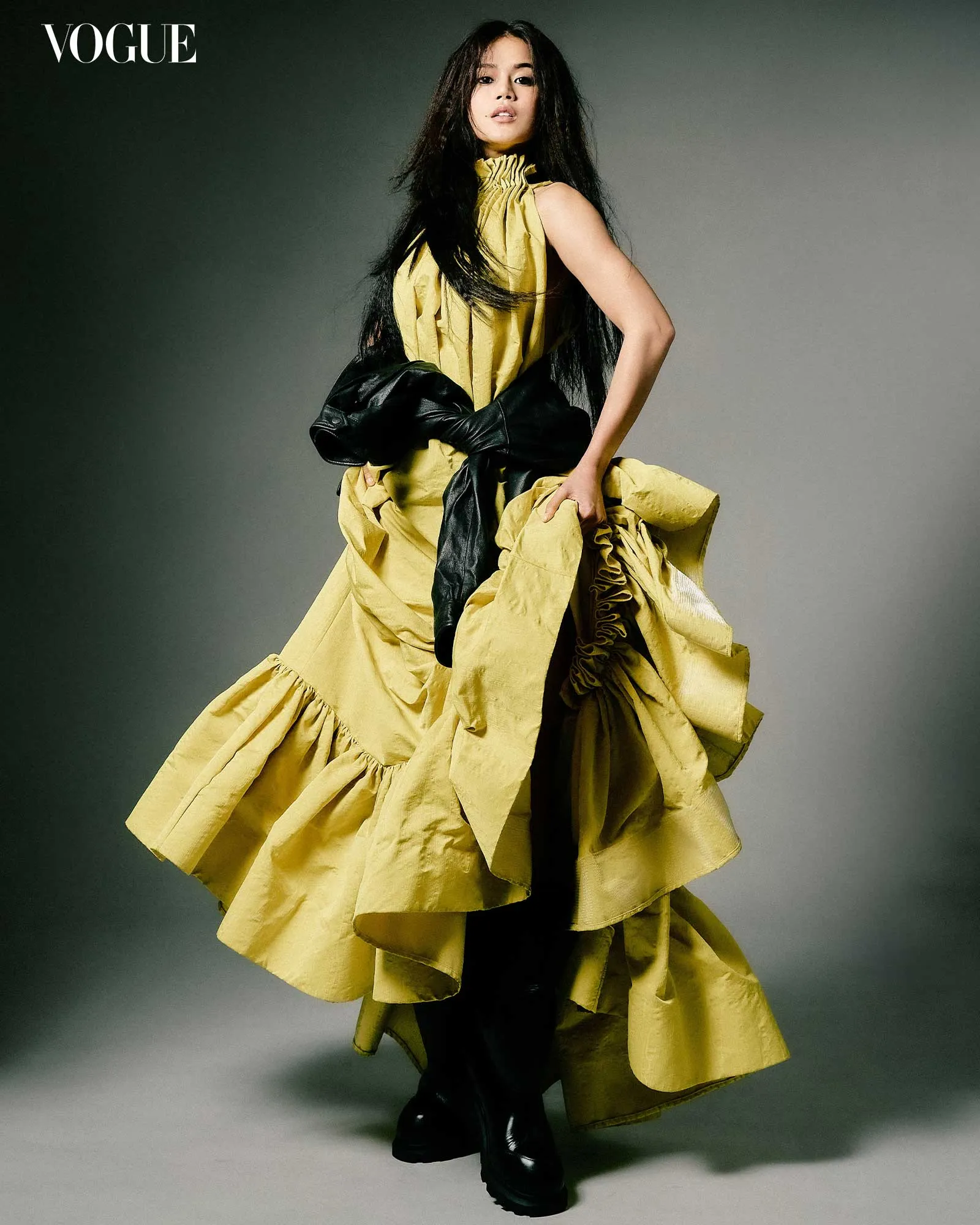
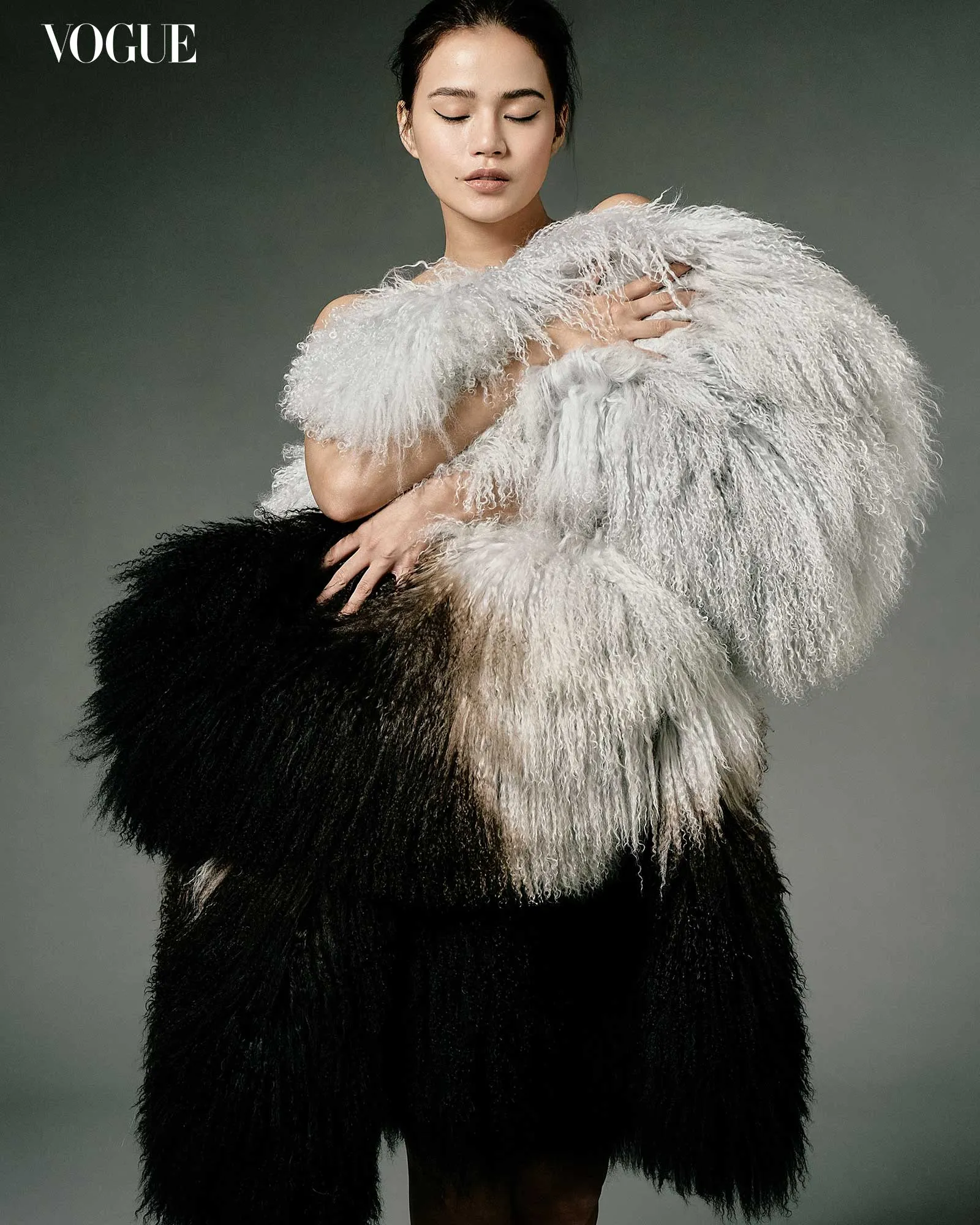
Jadaone, in particular, has been a favorite collaborator. For one, Maris is in awe of how she’s able to write complex female characters. “She gets it. You know, the chaos in their heads, the turmoil, the cynicism, the recklessness, the naïveté.” What she loves the most is how Jadaone’s female characters don’t appear weak, but human. “I love working with her because she tests your limits, your instincts. And personally, I love being mentally stimulated.”
She goes on passionately, “Ang saya kasi ’pag female energy. There’s this kind of security that I feel on the set na hindi papabayan yung character ko, because I love empowered characters. I also love playing imperfect characters. But meron talagang kind of taste yung babae na kahit sobrang flawed nung characters, hindi nila pinakapita as weak. And I love that about women directors, and I love that about women in production.”
Apart from her family and colleagues, women make up her inner circle of friends, too, including her best friend and fellow actress Nourijune Hooshmand. “People often told me that showbiz would be a world of constant competition, but with her, I never felt that,” Nourijune intimates. “We’ve always known how to hold each other up when the other feels like falling. In an industry that can be so loud and unforgiving, I’ve been lucky to find something steady; someone who reminds me that real support, the kind that comes without condition, still exists.”
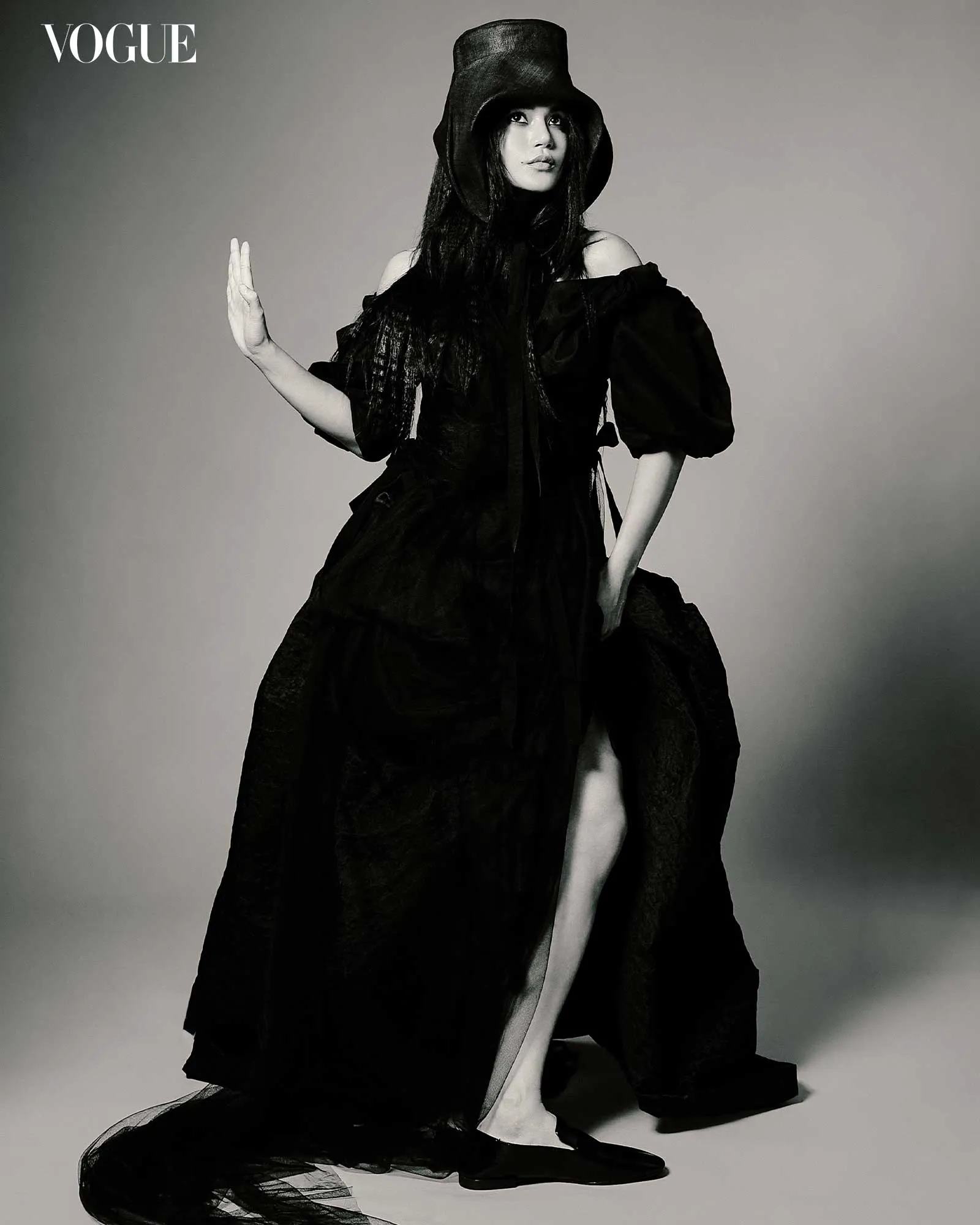
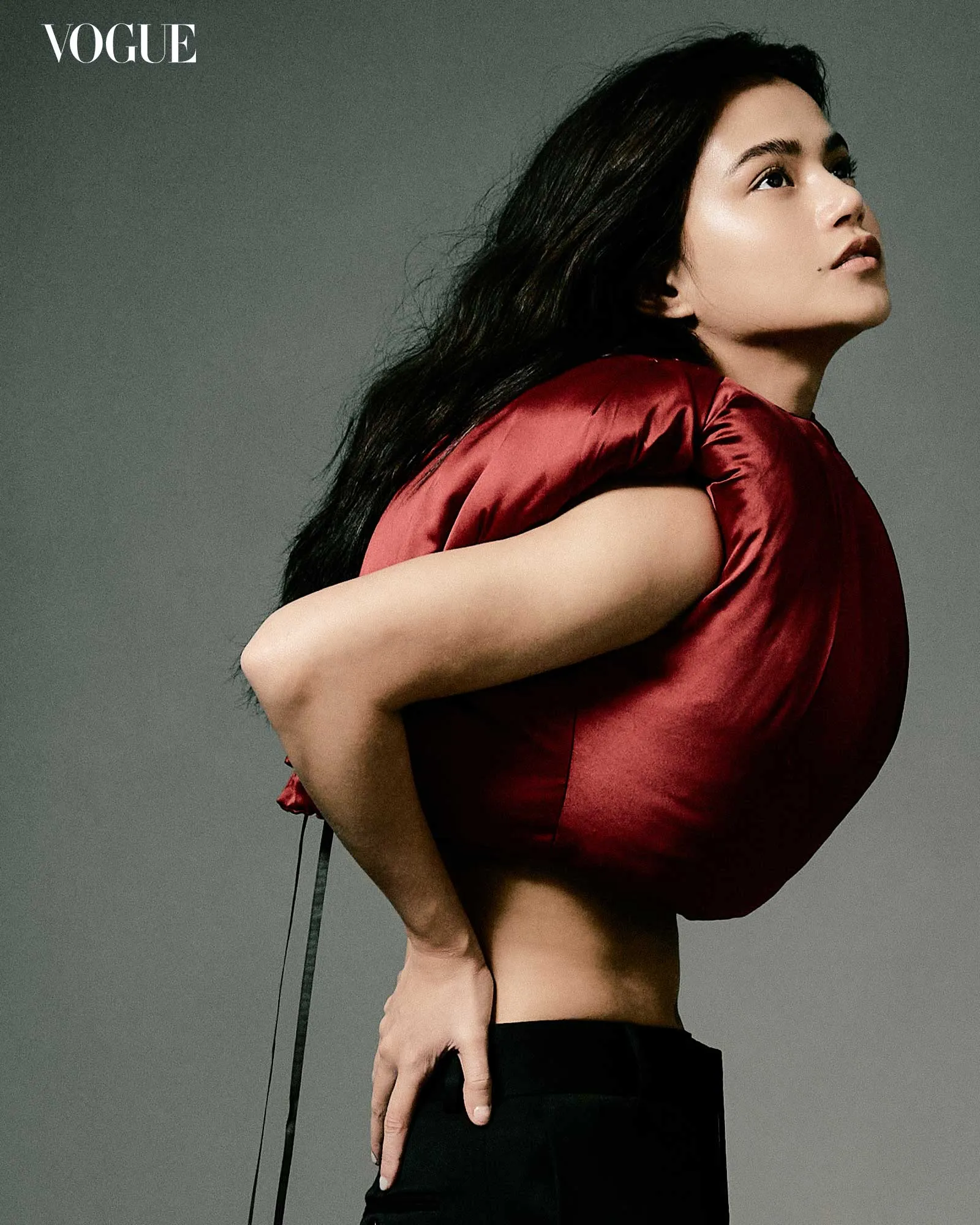
Maris’ over a decade in show business is one that has always been and will continue to be in flux, but it’s at this present moment, at the new heights of her career, that two things are most true: she has changed tremendously, and she is also who she has always been.
When the cameras stop rolling and when the T-marks are picked up off the floor, who is Maris, really?
In her own words, she’s a girl who has “Paint The Town Blue” on loop because she just finished the animated series Arcane, who scrolls through Pinterest because it’s “the social media app that does not give me anxiety, because it’s just full of art.” She goes to therapy regularly, adopts an Indian sit on the makeup chair, calls her older sisters first when in a crisis. She’s very human, not superhuman. Not even close. She’s not perfect, not always positive, but she tries. There are times, she confesses, that she lets anxiety win. But above all, she’s a fighter, a lover, a sister, daughter, and friend.
These days, when her world suddenly slows, it still feels a lot like love at first sight. But the receiving end of her affection is no longer a romantic interest to woo or a lady in a white coat to admire. When time stops, Maris looks up, and for the first time, she finds herself there.
By TICIA ALMAZAN. Photographs by KARL KING AGUÑA. Styling by ANZ HIZON. Digital Associate Editor CHELSEA SARABIA. Producer: Julian Rodriguez. Hair: Gab Villegas. Makeup: Pam Robes. Video by EJ Bonagua. Photographer’s assistants: Rojan Maguyon, Francis Calaguas. Video assistant: Angelo Cruz. Gaffer: Marvin Mendoza. Digital content writer: Daphne Sagun. Copywriter: Aylli Cortez. Multimedia Artist: Bea Lu.
